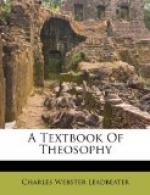The same thing applies to the astral and mental bodies. In the cell-life which permeates them there is as yet nothing in the way of intelligence, but there is a strong instinct always pressing in the direction of what is for its development. The life animating the matter of which such bodies are built is upon the outward arc of evolution, moving downwards or outwards into matter, so that progress for it means to descend into denser forms of matter, and to learn to express itself through them. Unfoldment for the man is just the opposite of this; he has already sunk deeply into matter and is now rising out of that towards his source. There is consequently a constant conflict of interests between the man within and the life inhabiting the matter of his vehicles, inasmuch as its tendency is downward, while his is upward.
The matter of the astral body (or rather the life animating its molecules) desires for its evolution such undulations as it can get, of as many different kinds as possible, and as coarse as possible. The next step in its evolution will be to ensoul physical matter and become used to its still slower oscillations; and as a step on the way to that, it desires the grossest of the astral vibrations. It has not the intelligence definitely to plan for these; but its instinct helps it to discover how most easily to procure them.
The molecules of the astral body are constantly changing, as are those of the physical body, but nevertheless the life in the mass of those astral molecules has a sense, though a very vague sense, of itself as a whole—as a kind of temporary entity. It does not know that it is part of a man’s astral body; it is quite incapable of understanding what a man is; but it realizes in a blind way that under its present conditions it receives many more waves, and much stronger ones, than it would receive if floating at large in the atmosphere. It would then only occasionally catch, as from a distance, the radiation of man’s passions and emotions; now it is in the very heart of them, it can miss none, and it gets them at their strongest. Therefore it feels itself in a good position, and it makes an effort to retain that position. It finds itself in contact with something finer than itself—the matter of the man’s mental body; and it comes to feel that if it can contrive to involve that finer something in its own undulations, they will be greatly intensified and prolonged.
Since astral matter is the vehicle of desire and mental matter is the vehicle of thought, this instinct, when translated into our language, means that if the astral body can induce us to think that we want what it wants, it is much more likely to get it. Thus it exercises a slow steady pressure upon the man—a kind of hunger on its side, but for him a temptation to what is coarse and undesirable. If he be a passionate man there is a gentle but ceaseless pressure in the direction of irritability; if he be a sensual man, an equally steady pressure in the direction of impurity.




